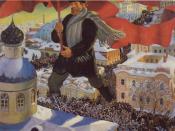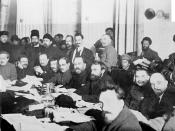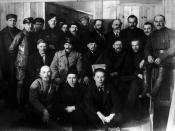Bolshevism And It's Effect on the Russian Revolution In the early nineteen hundreds, a very small minority group, consisting of around 33,000 members, formed the Bolshevik party. They consisted mainly of the intelligencia, or the middle class. (They would later become against the Mensheviks, who had the support of the lower class, until history changed it all). This party, (Bolsheviks), believed in a Marxist Revolution, without each step. The Bolsheviks gained the support of millions, in order to cause the Russian Revolution, under the leadership of Josef Stalin, and with the support of Vladimir Lenin. In order for one to understand the influence held by this party, it is necessary to trace the past events of a country with much turmoil and sufferance. The Bolshevik rule brought both positive and negative aspects for Russia, though the majority were negative. Their rule lasted till sometime in 1989, when communism ended. How they managed to gain the country's support for so long is quite astonishing, taking in consideration that they were such a small group.
Before the time of the Bolsheviks, a very important person began to express his thoughts, and take some actions in Russia. This person was Vladimir Lenin. Lenin was the chief disciple of the leading late-nineteenth-century Russian Marxist; Gregory Plekhanov. Lenin was to become the future leader of the Communist Revolution. Vladimir Ilyich Ulyanov, (Lenin), was the son of a high bureaucrat. His older brother had been involved in radical politics, and was also arrested for being part of a plot against Alexander III. He was executed in 1887, and his brother, Lenin, became known as the brother of an assassin. This title did not help Lenin's reputation. He moved to Saint Petersburg, where he studied law and also got involved with revolutionary group. As a result...


